|
|
|


|
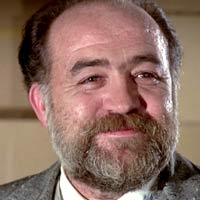 |
|
Image © ITV Studios, 1969 |
| |
Ronald Radd
Character & Episode:
Pargiter in Just for the Record
Born: 22/01/1929, Ryhope, Sunderland, England
Died: 23/04/1976, Toronto, Ontario, Canada
Ronald Radd was educated at Ryhope
Grammar School (also known as Robert Richardson Grammar School)
in Ryhope, County Durham, which he attended from 1940 to 1945 while
staying with his grandparents. While at Ryhope, he became a
leading light in their School Dramatic Society, impressing
particularly in Shakespearean plays, including The Merchant
of Venice (role: Shylock) and Henry IV (title
role). He made his first professional
stage appearance soon after gaining his Oxford School
certificate in 1945, when he joined the Northampton Repertory
Company in November of the same year. In early 1947 his work
with the company was interrupted when he was conscripted by the
armed forces and entered the Navy. After returning to civilian
life, he resumed his stage career in Northampton and remained
there until 1952, when he joined the Alexandra Theatre Company
in Birmingham, along with the likes of Leslie Sands and Edward
Mulhare. By 1954, he was appearing in London West End theatre,
and three years later he went to the United States of America,
when he was added to the cast of Feydeau's Hotel Paradiso
on Broadway. Soon afterwards in December 1957, he took over the
Stanley Holloway role in My Fair Lady on Broadway and
worked there until late 1961. Ronald would later be nominated
for Broadway's Tony Award as the Best Supporting or Featured
Actor for Abelard and Heloise.
Ronald made his screen debut in a televised
stage play, Simon and Laura, specially selected excerpts
from which were transmitted by the BBC on 3rd January 1955. The
production was staged at the Strand Theatre and the cast
included Roland Culver, Coral Browne, Ian Carmichael and Dora
Bryan. In 1957 Ronald had a role in a BBC children's television
serialisation of A Tale of Two Cities, which also
featured Peter Wyngarde. Coincidentally, Ronald and Peter would
work together again later in the same year, when they both
featured in a fictional period drama, Ordeal by Fire,
directed by Rudolph Cartier and involving the apparent
resurrection of Joan of Arc.
Ronald's move to the USA to work there on
the stage led to him making a number of screen appearances.
These
included an NBC Television production of The Tempest, in
which he portrayed the drunkard Stefano alongside
actors such as Richard Burton and Maurice Evans, and a four-hour adaptation of Eugene
O'Neill's The Iceman Cometh, which was transmitted in two parts on November 14th and
21st 1960. Ronald also became
a well-known face in the NBC children's series The Shari Lewis
Show in the early 1960s.
Once he had returned to the United Kingdom,
Ronald made numerous appearances in many well-known shows that
included Danger Man, The Avengers, The Saint,
Department S, Jason King and The Protectors.
Arguably his best known role came in the ABC Television
espionage series, Callan, in which he played one of the
agent-cum-hit man Callan's bosses - all of whom were named
Hunter. Two other Randall and Hopkirk (Deceased) actors –
Michael Goodliffe and William Squire – also portrayed this role
during the series' lengthy run. Ronald's last television appearance was in an adaptation
of the Sophocles play Oedipus Tyrannus for the Open
University, which was first screened by the BBC on 20th February
1977, some eight months after Ronald's death.
On the big screen, Ronald appeared in films
such as Hammer’s The Camp on Blood Island (1958), John
Huston's The Kremlin Letter (1969) and Sidney Lumet’s
The Offence (1973).
In his personal life, Ronald was married to
Dorothy May Goodman (1929-2001). They had a son and two
daughters. Sadly, Ronald died in hospital of a cerebral
haemorrhage at the age of 47, the day after he had collapsed
offstage after delivering his last speech while performing in
the musical Great Expectations in Canada.
|
|
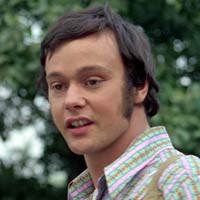 |
|
Image © ITV Studios, 1969 |
| |
Michael Radford
Character & Episode:
Male Hiker in The Smile Behind the Veil
Born: 24/02/1946, New Delhi, India (as Oswald Michael
James Radford)
The son of a British father and an Austrian
Jewish mother, Michael Radford grew up mainly in the Middle
East, where his father was serving in the British Army. Michael
was educated at Bedford School and then Worcester College,
Oxford, where he studied to become an educator. After graduating
from college in 1967 and teaching for a few years in Edinburgh,
he went to the National Film and Television School, becoming a
student there in its inaugural year, 1971. He made his first
experimental short films during this time.
Michael is well known for being a director and writer; he
only has three screen acting credits to his name, all minor with
only a few seconds of screen time. After graduating in 1974, he
began work as a documentary film maker and worked on a number of
different projects, including television films for BBC from 1976
to 1982. He then left to pursue a directing career,
coming to international attention with Nineteen Eighty-Four
(1984), his adaptation of George Orwell's most famous novel. It
starred John Hurt as Winston Smith, alongside Richard Burton who
was giving his final film performance. The film was made in the
time and place (London, April–June 1984) in which the book was
set. Michael is most widely known as the writer and director of
the 1994 film Il Postino, which he adapted from the novel
Ardiente Paciencia by Antonio Skármeta. The massive
international success of the film (for many years it was the
highest grossing non-English language film ever made) led to
international acclaim for Radford and the star of the film
Massimo Troisi, who had died tragically the day after filming on
Il Postino was completed. The film won many international
film awards including a BAFTA for Radford, who was also
nominated for the Best Director and Adapted Screenplay Academy
Awards. In 2003, Radford directed The Merchant of Venice.
Three years later he was responsible for Flawless, a
diamond heist story set in 1960 which starred Demi Moore and
Michael Caine. His most recent film is La Musica del Silenzio
(2017), a biographical drama about Andrea Bocelli starring
Antonio Banderas.
In his personal life, Michael was first married to Iseult Joanna St. Aubin de Teran (1973-), with whom
he had a son, Felix (born 1991). His second and current wife is
Emma Tweed. The couple have two children, a daughter, Amaryllis
(born 2005), and a son, Linus (born 2010). Michael speaks fluent Spanish, French, Italian and some Mandarin. In
2013 he took part in the Clipper Around the World Sailing Race,
in which he raced one of twelve identical 70 foot racing yachts
from London to Rio. For someone who appeared in only a small
role in Randall and Hopkirk (Deceased), Michael has led a
remarkably interesting and rich life.
|
|
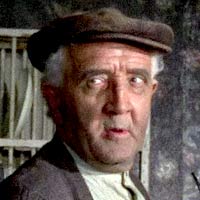 |
|
Image © ITV Studios, 1969 |
| |
John Rae
Character & Episode:
Mr Alexander in A Sentimental Journey
Born: 21/06/1895, Perth, Scotland
Died: 04/06/1977, Hampstead, London, England
John Rae followed up his Perth Academy
education with a course at Dundee Technical College. During the
First World War, he served in the 6th Black Watch between 1914
and 1917, whilst in the Second World War he worked as an Air
Raid Precaution (ARP) Warden in London. He began in the
performing arts as an amateur actor, having originally pursued a career as a
ship's engineer. For several years up until 1931 he appeared
regularly with the Scottish National Players. During this
period, in 1926, he came to London, following this up with
theatrical tours and repertory theatre, ultimately appearing at
the Malvern Festival, and in London productions. He appeared on
television for first time in an adapted play in 1938. Over the
next forty years he would be called on regularly to play
middle-aged-to-elderly actor roles in a number of now largely
forgotten films. He also occasionally acted as a dialect adviser
to film companies.
From the mid-Fifties, his main output consisted
of television guest appearances on a number of shows that
included Crossroads, Gideon Way, Dr Finlay's
Casebook and The Onedin Line. John's last appearance
was in the drama series Bouquet of Barbed Wire in 1976.
John is also notable for featuring in two of the three legendary
Quatermass television serials of the Fifties, appearing
in Quatermass II (1955) as McLeod and in Quatermass
and the Pit (1958) as a works foreman. He was also active in
radio drama and was married to wife Schottische until his death
in 1977.
|
|
Michael Rathborne
Character & Episode:
Man in Laundromat in All Work and No Pay
Born: 06/04/1923, York, England (as Michael Brabazon
Rathborne)
Died: 22/01/1971, Kensington, London, England
An actor whose a screen
appearances were infrequent, Michael Rathborne was the son of an Irish
major in the Durham Light Infantry, his mother being a trained
ballet and musical theatre dancer. The marriage was said to be a
difficult one. Growing up, he was educated at Churcher's
College. In the Second World War, Michael saw active
service as a captain in his father's regiment. At the age
of twenty-one he was promoted to acting major in the Burma
Campaign of 1944-45, and was wounded in fighting. Soon after the
war, he trained at Central School of Speech & Drama, graduating
in late 1940s and made his screen acting debut in early 1950s,
with one of his earliest roles being in the BBC’s Sunday Night
Theatre play strand in 1952. Other contributions, which
often went uncredited, included the television serial
Quatermass II (1955), Doctor Who (as a taxi driver in
The War Machines, 1966) and The Mini Affair
(1967). Michael's appearance in Randall and Hopkirk
(Deceased) proved to be his final screen credit, though he
continued to appear without credit after this, and worked in
this capacity on the feature film
Connecting Rooms (1970). The film, which starred Bette
Davis and Michael Redgrave, did not receive a British cinema
release until May 1972, which was more than a year after Michael
has passed.
In his private life, he was
married to actress Diana van Proosdy (1929-2007), and their
daughter, Pippa Rathborne, is also an actress. Either in
Burma, or from childhood exposure to contaminated water in
Egypt, where his father had been stationed, he contracted the
liver disease which eventually killed him, aged 47.
|
|
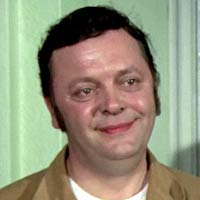 |
|
Image © ITV Studios, 1969 |
| |
Geoffrey Reed
Character & Episode:
First Male Nurse (Philip) in A Disturbing Case
Born: 14/11/1921, Chester, Cheshire, England (as
Geoffrey Hugh Reed)
Died: 05/09/2008, Bembridge, Isle of Wight, England
With a father, William John Reed, who
worked as a music hall comedian, and an older brother Jack Reed,
who became a well-known ventriloquist, it was likely
that Geoffrey Reed would also enter show business. He
did this by commencing his stage career during the 1930s and worked as a
repertory actor with touring companies for several years at that
time. Later, Geoffrey also worked as a stage producer and
director.
Geoffrey came to television in 1957, having
started the year as a butchery department assistant at Messrs.
Littlewoods store. His turning point came in October 1957 when
he was camera tested for the role of Police Sergeant Reed in the
Granada Television series Shadow Squad. He won the role
and this proved to be the start of a new phase in his acting
career. Geoffrey went on to make more than fifty screen
appearances, most of which were in minor supporting roles. He
made contributions in a variety of supporting roles to several series,
including the well-known Coronation Street (between 1961 and 1969) and Z Cars
(between 1965 and 1978). He also featured
in The Avengers, The
Prisoner, Man in a Suitcase and The Adventurer.
His last television credit was in All Creatures Great and
Small, adapted from the novels of James Herriot, in 1978.
On the big screen, Geoffrey appeared in
films such as The File of the Golden Goose (1969) and
Roman Polanski's Macbeth (1971).
In his personal life, Geoffrey was married
to actress Joan Francis (1921-1995, real name Frances M J Willey), but the marriage ended in
divorce. Geoffrey and Joan shared a love of the theatre, and
they also ran public houses together on Isle of Wight.
|
|
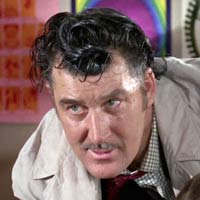 |
|
Image © ITV Studios, 1969 |
| |
Bill Reid
Character & Episode:
Parkin in When the Spirit Moves You
Born: Ballygub, County Kilkenny, Ireland
Bill Reid took to athletics as a child.
During the Second World War, while he was in the army he won
many athletics and cycling titles including becoming the
All-Army Champion in the 16lb and 36lb Shot Putt (in this he was
following in the footsteps of his grandfather, also called Bill
Reid, who was also a weight thrower). He was also reported to be
a good pole vaulter and was runner-up in this event at the 1943
Irish Championship. Soon after he was demobbed, he took to
lifeguard duty in his native country, a job that he held for
some years with several rescues to his name. While serving in
this role, he continued with his sporting pursuits, training in
several disciplines including boxing. In 1952 and 1953
he was heavyweight boxing champion of Ireland and it is also
known that he was also recognised as a judo expert in the 1950s.
Bill's career in the film industry
commenced soon after when he was taken on to replace
a stuntman who had become injured whilst doubling for Hollywood
star Rock Hudson on a film shot in Ireland in the summer of 1954,
Captain Lightfoot (released in 1955). Bill went on to appear in many films, mainly as a stunt
performer, although he was on occasion cast in acting roles of a
minor nature. Films on which he was employed as an actor include
Crooks Anonymous (1962), Heavens Above! (1963) and
The Bargee (1964). On television, he appeared in such
series as Danger Man, The Avengers and The
Persuaders!
|
|
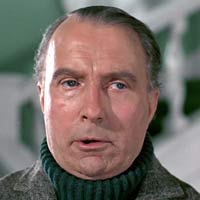 |
|
Image © ITV Studios, 1969 |
| |
Cyril Renison
Character & Episode:
Andrews in But What a Sweet Little Room
Born: 24/01/1903, Kingston-upon-Thames, Surrey, England
(as Cyril Ernest Cobb)
Died: 08/12/1993, London, England
Cyril Renison began his career on the stage as a youth, acting under his real
name, Cyril Cobb. By the mid-1920s, he was working as Cyril
Renison, and over the course of a long career in the business,
he made many film and television appearances, most of these
being in bit-part roles. Cyril's first screen credit was in 1955
in the crime drama As I Was Saying. Other notable
contributions around this time were to famous series such as
Quatermass II (1955) and The Avengers (two
appearances, one in 1961 and another in 1962 alongside Patrick
Macnee, Ian Hendry and latterly Honor Blackman). His last screen
credit came in 1973 when he had a minor role in O Lucky Man!,
the comedy fantasy film which starred Malcolm McDowell.
|
|
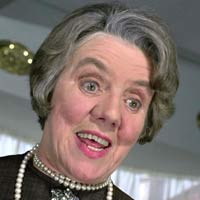 |
|
Image © ITV Studios, 1969 |
| |
Marjorie Rhodes
Character & Episode:
Mrs Pleasance in For the Girl Who Has Everything
Born: 09/04/1897, Hull, East Riding of Yorkshire, England
(as Millicent Rhodes Wise)
Died: 03/07/1979, Hove, East Sussex, England
Marjorie Rhodes was a popular North Country character
actress who was particularly prolific in the theatre. She
attended the Somerset Street Board School in Hull, after which
she worked as a shop assistant. Wanting more than this, she ran
away from home to work on the stage and began her career in a
travelling concert party. In 1926, she came to London, where for
the first time she appeared at stage as one of the native girls
in play, Aloma. Later, she took time out from her
career to devote time to her family, returning to the stage in
the second half of the 1930s. She would go on to make her first
screen appearance in
1938. She was busy in films during the war, figuring
mainly in small roles. By the late Fifties she was appearing more regularly
on television and made notable contributions to such series as
The Army Game, Dixon of Dock Green and All Gas
and Gaiters. Still busy in theatre, Marjorie was nominated
for a Broadway Tony Award in 1965 as best actress for the play
All in Good Time. Her last screen appearance was in 1974
in an episode of Z Cars; she withdrew from acting in her
later years due to failing health. During her career she clocked up
more than one hundred television and film credits and was also
active in radio. She often played landladies, aunts or
busybodies.
In her personal life, Marjorie was married
to Harry Colin Edgell (1903-1944), who was the Honorary
Secretary of the London Young Liberals. She and
Harry had a daughter, Colleen, who was born in 1930. When she
passed away in 1979, she was survived by her daughter and four
grandchildren.
|
|
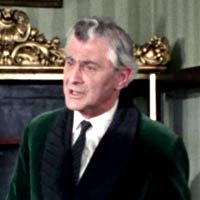 |
|
Image © ITV Studios, 1969 |
| |
John Richmond
Character & Episode:
Lord Manning in Whoever Heard of a Ghost Dying?
Born: 14/06/1912, Hendon, Middlesex, England (as John
Vernon Richmond)
Died: 08/11/1992, Thursley, Surrey, England
John Richmond was educated at London's University College, where
he was president of the Students' Union and appeared in
different stage plays, one of which was broadcast on radio in
1934. Afterwards, he studied acting at the Embassy School of
Acting, while also appearing in radio production. He established
himself over the next few years as a stage and a radio actor,
but in the mid- to late 1930s he changed tack, becoming a BBC
radio producer, sometimes adapting and writing radio plays.
During the Second World War, he served with the RAF with the
rank of flying-officer and afterwards resumed his position as a
producer for BBC Radio until 1948. In his last year in this
role, he returned to acting and appeared for the first time in a
television production - in the play Reunion (transmitted
live on Sunday 21st November 1948) for the BBC. His subsequent
radio appearances were mainly in drama productions (some of
which, as before, were his own adaptations) and he was much in demand as a noted narrator of plays.
John's television career began to develop
from the mid-1950s. He guested in such series as
The Grove Family, Emergency Ward 10 and was a cast
regular in the detective series Sergeant Cork. Later
roles came in Special Branch, The Pallisers and
the Sir John Mills Quatermass. His last credited screen appearance
was in 1984 in the series Strangers and Brothers. Despite quite a long career, he only made about fifty credited
screen appearances. He also wrote and introduced some children's
educational serials for Associated-Rediffusion and adapted plays
for television during the 1960s. For a
number of years he taught microphone technique to students at
the Central School of Speech and Drama.
John was firstly married to the actress
Sara Jackson (1910-1982), who later became a children writer,
and then to Dora Campbell (1915-1997). He was father to three
children. In his later years he found great happiness with the
actress Barbara Bolton (1927-2017), who nursed him devotedly through the two
years of his final illness.
|
|
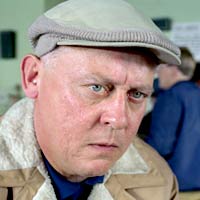 |
|
Image © ITV Studios, 1969 |
| |
Michael Ripper
Character & Episode:
Punter in It's Supposed To Be Thicker Than Water
Born: 27/01/1913, Portsmouth, Hampshire, England (as
Michael George Paul Ripper)
Died: 28/06/2000, London, England
From a young age, Michael Ripper was encouraged to
enter poetry recital competitions by his father, Harold Ripper,
a speech therapist by profession who taught elocution. By his
own admission, Michael was never particularly interested in
becoming an actor and felt that his father, a strict family
disciplinarian in the Victorian sense who was himself an amateur
dramatics producer, had pushed him into the profession. One of
the recital competitions, The Oxford Verse Speaking Contest,
led to a chance encounter with the actor Alistair Sim, who
became a good friend of the family. It was ultimately Michael's
school doctor that finally persuaded Michael to try acting
full-time, but his father's introduction to amateur dramatics
had put him in good stead for a career that would last for more
than sixty years. In that time, Michael would appear in well
over two hundred and fifty films and television series, and
become a recognised, well-liked and reliable supporting
character actor.
Michael entered the theatre in 1929 after
winning a scholarship with The Central School of Speech and
Drama, where he trained for one year. He made his film debut in
1936 in Twice Branded, and worked both as an actor and
assistant director for Walton Studios in the early years of his
career.
When his acting career quickly blossomed, he left directing to
concentrate on work in front of the camera and on stage. He
would come to worldwide notice through his lengthy relationship
with Hammer Film Productions, appearing in many of company's
films, mostly in the horror genre with which Hammer became
synonymous. For them, he played parts such as innkeepers,
gravediggers and poachers, with Michael often bringing an air of comedy
to these roles. His most
notable Hammer films include The Revenge of Frankenstein
(1958), The Mummy (1959), Brides of Dracula
(1960), The Camp on Blood Island (1958), Captain Clegg
(1962), The Scarlet Blade (1963), Plague of the
Zombies (1966) and The Mummy's Shroud (1967).
Occasionally he was disguised almost beyond recognition, and yet
his raspy voice remained unmistakable. Some roles were minor,
but his penultimate role for Hammer Films was a significant
supporting part as a landlord in Scars of Dracula in
1970. Michael holds the record for the most Hammer film
appearances - 34 - and while there is no doubting Ripper's talent and
dependability, this achievement undoubtedly also owes something
to his close friendship with Hammer producer Anthony Hinds.
Michael suffered from a thyroid condition which meant after
he underwent an operation in 1952
his ability to project his voice on stage was greatly affected,
and therefore he devoted himself to work in film and television. He is also well remembered for his role
as the liftman in some of the St Trinian's comedies, and
on television for his role as Thomas the chauffeur in the BBC
comedy Butterflies (1978–83) and as Burke, one of the two
criminals in the children's television series Freewheelers
in 1971. His other TV roles include Phunkey in The Pickwick
Papers (1985) and as Drones Porter in Jeeves and Wooster
(1990–91).
In his personal life, he was married three
times and had a daughter from his first marriage. His third
wife, Cecilia Doidge-Ripper (1943-2010), was proud to present
the award for the Michael Ripper Speech and Voice Competition,
inaugurated in 2007 by the Portsmouth Grammar School, where he
had studied as a youth, until she passed away. He listed his
hobbies as photography, woodworking and classical music. In
2007, seven years after his death, the Daily Express included
him in the top five of their list of great B-movie actors
alongside Peter Cushing, Hattie Jacques, Denholm Elliot and Joan
Collins. They noted that he was being celebrated at last as "the
most half-recognised British actor of all-time", a comment that
no doubt hints at one of the reasons that he enjoyed such an
enduring and prolific career.
|
|
Colin Rix
Character & Episode:
Police Driver in Vendetta for a Dead Man
Born: 03/03/1932, Brentford, Middlesex, England (as Colin
Arthur Rix)
Died: 11/11/2013, Newcastle, Monmouthshire, Wales
In common with most people cast in
supporting
roles in Randall and Hopkirk (Deceased), Colin Rix was a
reliable actor who often appeared in minor roles. He studied for
acting at the Central School of Speech and Drama in the early
1950s. He
contributed to well over one hundred and fifty film and television
productions in a career which last for nearly forty years. He
seems to have made his television debut in 1955 in The Makepeace Story,
a play in the BBC's Sunday Night Theatre strand and this
was followed with a steady flow of work which really picked up
momentum in the early Sixties. His most notable appearances
included Z Cars (five episodes between 1963 and 1972 as
well as two episodes of its spin-off Softly Softly),
Dixon of Dock Green (six episodes, 1966-68), Public Eye
(two episodes, 1966 and 1968), Castle Haven (more than
two dozen episodes of this 'lost' Yorkshire Television soap
opera of 1969-70), Dick Barton Special Agent (1979),
The Professionals (1980), The Gentle Touch (1983) and
in 1992 he was a regular cast member in Forever Green,
playing PC Dave Weatherby alongside Pauline Collins and John
Alderton. Colin's last screen appearance was in Ian McShane’s
Lovejoy in 1993.
In his personal life, Colin was married to
former stage actress Greeta Pedlingham (1932-2014) from 1955 until his death in November 2013.
|
|
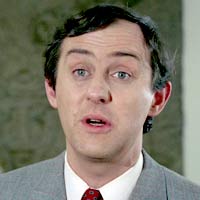 |
|
Image © ITV Studios, 1969 |
| |
Anton Rodgers
Character & Episode:
Calvin P Bream in When the Spirit Moves You
Born: 10/01/1933, Wisbech, Cambridgeshire, England
(as Anthony Rodgers)
Died: 01/12/2007, Reading, Berkshire, England
Anton Rodgers, the son of Leonore Victoria
Wood (1896-1966) and William Robert Rodgers (1894-1976),
attended Westminster School as a child. Initially he wanted to
be a doctor, but his mother (a former singer) ran a dance school
and from the age of five Anton was acting and singing in charity
shows. This led him into wanting to be an actor, later training
at the Italia Conti Academy and LAMDA.
Anton’s first professional stage appearance was
at 14 in 1947, when he toured in an adaptation of Charles
Dickens' Great Expectations, playing Pip. His West End debut in Carmen at
the Royal Opera House, Covent Garden, came in the same year. In 1948,
he toured the United Kingdom in the title role in a revival
of Terence Rattigan's The Winslow Boy. After studying at
LAMDA, Rodgers did his national service: he joined with RAF and
became Chief Announcer and Programme Officer with the Forces
Broadcasting Service in Egypt.
Anton was a regular in the theatre
throughout his career; in 1963 he gained excellent reviews as Mr
Jingle in the musical Pickwick, which later transferred
to Broadway in America. He also directed numerous plays in the
regions and on the fringe.
Anton’s screen debut came in his teenage
years, although truthfully his long and extensive career in
television and film really began to gain momentum in the second
half of the 1950s. He quickly gained a reputation for playing comedy. In 1961 he played a
character called Alec in the film Petticoat Pirates and
the following year appeared in Carry On
Cruising (he was also cast as Captain Thomas Hardy in Carry on Jack in 1963).
In 1970, he featured in the film Scrooge and a song that
he sang as part of the production, Thank You Very Much,
was nominated for two awards.
Also, that year he played Tony Alexander in the film The
Man Who Haunted Himself, which starred Roger Moore in an
atypical
lead role. In 1987, he had a role in the film The Fourth
Protocol and the following year he played Inspector André in
the film comedy Dirty Rotten Scoundrels which starred
Michael Caine and Steve Martin. Towards the end of his life, he
featured in Secret Passage (2004) and Go Go Tales
(2007).
He also worked in filmed
television, with roles in ITC series such as Danger Man,
The Saint, Man in a Suitcase, The Prisoner,
The Champions, Department S, Randall and
Hopkirk (Deceased) and Jason King.
Anton was also adept in videotaped drama,
quite a different discipline, arguably more in common with
performing for the stage. In 1958, he starred in his first
regular television role as Lt. Gilmore, RN in the BBC sitcom
series The Sky Larks. In 1972, he was a prominent member
of a very strong cast in the Philip Mackie drama series The
Organisation and two years later starred as David Gradley in
the short-lived comedy drama series Zodiac alongside
Anouska Hempel.
From 1984 to 1986, he starred as William
Field in the comedy series Fresh Fields. It is in this
role that viewers probably remember him best; the series ran
to twenty-seven episodes and
also starred Julia McKenzie and Ann Beach. In 1989, the series
returned as French Fields, now based in France. This
series ran until 1991 with nineteen episodes being made.
McKenzie was still his co-star, and Pamela Salem became a cast
regular.
Between 1989 and 1994, Anton
starred in another successful comedy show, May To December,
as Alec, the lead solicitor in a practice. The series lasted for
39 episodes and amongst the cast were Frances White and Rebecca
Lacey. In 1997, Anton starred as Noah Kirby in the drama series
Noah’s Ark and in 2005 featured in C.S.Lewis: Beyond
Narnia. His last screen appearance was in the television
comedy You Can Choose Your Friends... in 2007, which reunited
him with Julia McKenzie.
Anton was married twice, the first
time to former ballet dancer Morna Watson (1934- ), and latterly to
actress Elizabeth Garvie (1957-) who was his junior by 24 years.
He had five children in all, two from his marriage to Morna and
three with Elizabeth. One of his sons, Adam, works in the
television industry in the camera department.
|
|
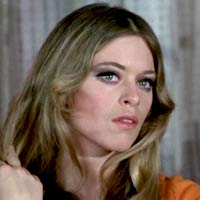 |
|
Image © ITV Studios, 1969 |
| |
Edina Ronay
Character & Episode:
Sandra in Never Trust a Ghost
Born: 01/1943, Budapest, Hungary (as Edina Maria
Ronay)
Edina Ronay is the daughter of world famous food
critic Egon Ronay (1915-2010), who moved the family to England
when she was four, having the sensed the changing political
climate in Hungary. Edina attended a convent school, but then
stopped being religious as she moved into her teens. Afterwards,
she attended Putney High School and then in 1959 went to study
design and fashion for one year in London at Saint Martin’s School of Art.
In following year, she went to see a retired film producer who
put her in touch with an agent, who secured her first screen
role - on television. Subsequently, she worked as an assistant
stage manager in a revue at Brighton, but was sacked for no good
reason by the impresario.
Upset, she went to an audition and was cast in her first feature
film, the
comedy The Pure Hell of St Trinian’s (1960), in which she
appeared in a small uncredited part as Lavinia. However, she
wanted more acting and in same year joined the Repertory Company
of Belgrade for a while as stage manager - also appearing in
small roles in their productions: "I did this for six months and
decided... I liked the theatre," she later told the Liverpool
Echo and Evening Express. By the age of 18 she started
regularly appearing on television and, believing that she lacked
polish, went to
study at The Royal Academy of Dramatic Art (RADA), from which
she graduated in 1963.
In 1962, she appeared in The
Avengers as Nicole Cauvin in the episode The Removal Men.
She would return to the series to play a different role shortly
afterwards. Then in 1964 she had a minor uncredited role playing
a girl at a disco in A Hard Day’s Night. Later that year
she starred as Julie in the film thriller Night Train To
Paris, which also starred Leslie Nielsen. Edina had a
sizable role in the 1965 comedy film The Big Job
alongside Jim Dale, Joan Sims, Sid James and Sylvia Sims. It was
at about this time that Edina started to make nostalgic handmade
knitwear and began selling them at London markets.
In 1965, she played Mary Kelly in
the hammer horror film A Study in Terror, which also
included Donald Houston and John Fraser amongst the cast. The
same year she played Dolores in Carry On Cowboy and
shared some funny scenes with Joan Sims, Angela Douglas and Jim
Dale. Later appearances included The Champions (1968) and
Jason King (1972) and her last screen appearance was in
1975 when Edina had a role as a harlot in the television series
Shades Of Greene episode called The Root Of Evil. She
then retired from the business to concentrate on her fashion
business which was expanding and soon to go global.
During the 1980s, she founded her own label
and in 1999 agreed a contract with Debenhams’s to supply
clothes. She has made her name in Fair Isle patterns, motifs and
bead decorations. With her numerous outworkers, she is one of
the biggest UK hand knit designers.
In her personal life, Edina has been
married to the photographer Dick Polak (1940-) since 1971 and
they have two children, son Max (1977- ) and daughter Shebah
Ronay (1972- ). Shebah became a writer and an actress and is
best remembered for her role as Natasha Andersen in the soap
Hollyoaks from 1995-99.
|
|
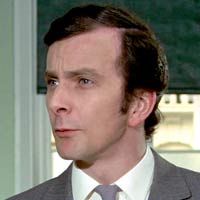 |
|
Image © ITV Studios, 1969 |
| |
Adrian Ropes
Character & Episode:
The Sergeant in A Disturbing Case
Born: 08/05/1941, Cairo, Egypt
Died: 11/03/2004, Norwich, Norfolk, England
Adrian Ropes trained at the Webber Douglas
School of Singing and Dramatic Art and started his professional
stage career in the early 1960s. He worked with the repertory
company at Her Majesty's Theatre in Barrow-in-Furness, then with
the Alexandra Repertory Company in Birmingham, and in 1963
appeared in the musical What Goes Up…! at the Theatre
Royal Stratford East.
Although Adrian only made something in the
region of twenty television appearances in the Sixties and
Seventies, he did feature in many well remembered series, such
as Emergency Ward 10 (in 1963), The Human Jungle
(1964), The Avengers (three episodes between 1966 and
1968) and Jennie: Lady Randolph Churchill (1974). Among
his other credits are three episodes of The Weasel Goes Pop,
the final adventure of the long-forgotten children's drama
series Quick Before They Catch Us (1966), which starred
Colin Bell, Pamela Franklin, Teddy Green and David Griffin.
Besides acting, in 1964 Adrian and Jeremy
Friend opened Grumbles, a bistro restaurant in London's Pimlico
area. More than half a century later it remains a popular
destination for locals and tourists.
|
|
Jan Rossini
Character & Episode:
Miss Moscow in Just for the Record
A bit-part actress, Jan Rossini made a
handful of television and film appearances during a career which
spanned nearly a decade. She received on-screen credits for her
roles in the films The Oblong Box (1969), The File of
the Golden Goose (1969, as Janet Rossini), Cry of the
Banshee (1970) and When Dinosaurs Ruled the Earth
(1970), a prehistoric epic from Hammer Films which starred
Victoria Vetri and co-stars Robin Hawdon (another Randall and
Hopkirk actor), Patrick Allen and Imogen Hassall.
On television, Jan had minor roles in drama
series such as R3 (1965) and Adam Adamant Lives!
(1967). The greater majority of her television work was in
comedy, albeit still in small roles. She was a semi-regular in
Hark at Barker (1969-1970), alongside Ronnie Barker, and
also made appearances in Steptoe and Son, Doctor in
the House, Scott On... and Oh in Colour (all
in 1970), as well as one edition of The Morecambe and Wise
Show in 1973, which appears to have been Jan's final screen
appearance.
|
|
Robert Russell
Character & Episode:
Harry in The Trouble With Women
Born: 24/05/1936, Kent, England
Died: 12/05/2008, Maidenhead, Berkshire, England
Robert Russell was a tall actor (6
foot 3 inches), thick set with dark, receding hair and often a
beard. For more than twenty years he was a useful supporting
actor, mainly in television. Though born in Kent, he spent nine
childhood years in South Africa, and upon leaving school there,
he worked for a time in a gold mine. On returning to England he
trained as an actor at the Webber Douglas Academy of Dramatic
Art. He then developed his skills in theatre, becoming a regular
member of the National Theatre touring company.
During his screen career Robert
amassed more than eighty
credits in film and television. Early on, he was stereotyped in
police roles, but by the mid-Sixties he was cast in more
interesting roles, for instance in the Saint episode
The Man Who Liked Lions and as Anger in Peter Cook and
Dudley Moore's Bedazzled (1967). His most memorable
supporting role came in 1968 when he played John Stearne
alongside Vincent Price in the cult horror film Witchfinder
General. On television at the turn of the decade he could be
seen in The Avengers, The Champions and
Department S, while he could briefly be spied on the big
screen playing a policeman in Carry On Loving (1970).
Robert's association with ITC film series continued into the
Seventies, with appearances in The Persuaders!, The
Protectors and the Space:1999 episode Mission of
the Darians. Robert also appeared two Doctor Who
stories; as an uncredited guard in The Power of the Daleks
(1966) and a fine turn as The Caber in Terror of the Zygons
(1975). In 1977 Robert was cast as Matvey in the historical
drama Anna Karenina. A year later he played the leader of
a religious cult on a penal planet in the Blake's 7
episode Cygnus Alpha as well as featuring in the
children's drama The Feathered Serpent alongside Diane
Keen and Patrick Troughton. Robert's television credits
continued into the Eighties and included roles in The Enigma
Files (1980), Sorry! (1981), Hammer House of
Horror (1984) and Black Arrow (1985). After this, Robert virtually retired from the
industry. His only other screen appearance was in 1992 when he
played the ironically-named Shorty in the sci-fi film
Strange Horizons. Robert died of a heart attack at home in
2008.
|
|
Paddy Ryan
Character & Episode:
Larry in Whoever Heard of a Ghost Dying?
Born: 03/01/1911, Greenwich, London, England (as Frank Ryan McCree Singletary)
Died: 10/05/1990, Watford, Hertfordshire, England
Paddy Ryan was one of the United Kingdom's
most important stunt performers. Dubbed the "father of British
stuntmen", it was Paddy who initiated the British Stunt
Register. He became involved in stunt work for feature films in
the second half of the 1920s and served in the Second World War
in the Desert Rats, the British 7th Armoured Division who
participated in the North African campaigns.
Despite having a career in films that
lasted for sixty years and dated back to the end of the silent
era in Britain, it was not until he acted in Dick Barton at
Bay (1950) that Paddy received his first credit on screen.
On television he appeared in such
series as The Saint, Adam Adamant Lives!, The
Avengers, The Persuaders! and Steptoe and Son.
His last television credit was in 1988 in the comedy series
Screenplay.
In his personal life, Paddy was married to
Agnes Campbell and was a father.
|
Section compiled by Darren Senior
Additional research and presentation by Denis Kirsanov and Alan Hayes
|
|
|
Back to Top |
|